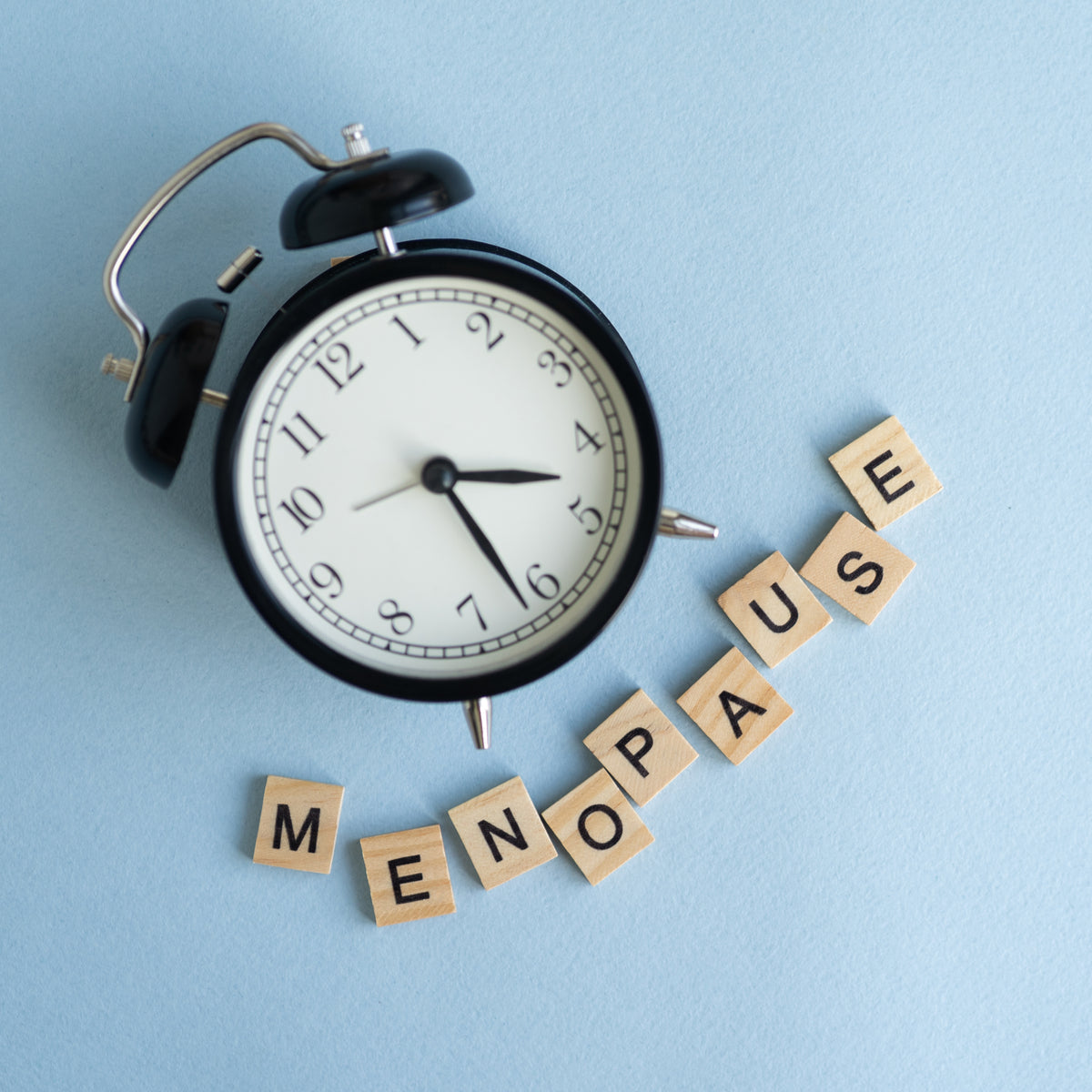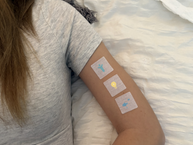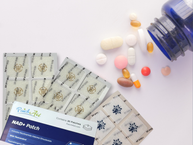Menopause symptoms can be burdensome, and they can last for a while. Still, you may be able to find menopause relief with certain lifestyle changes and with a menopause supplement, such as the PatchAid Menopause Relief Patch. Be sure to talk to your doctor at all stages of menopause and before taking any steps for menopause relief. That’s best for your safety and to be sure that you explore all possible options for healthy and effective relief from symptoms of menopause.
Diagnosing Menopause
How do you know if you’re in menopause? Menopause is when the ovaries stop releasing eggs. A woman is said to be in menopause if she goes 12 months without a menstrual period. The average age of this is 51 years.
The time leading up to this and following it is the perimenopausal period. Having some symptoms is part of being in the perimenopausal stage. Some women experience symptoms of menopause for 4 or more years.
That would be a long time to go without menopause relief! Fortunately, there are steps you can take to limit the impact of these symptoms on your body. Your doctor may suggest a menopause supplement, among other approaches, to provide menopause relief.
Menopausal Symptoms and Other Effects
The list of possible menopausal symptoms is long. Some women get more of these symptoms, while other women get fewer of them. These are common symptoms and approaches to treating them..
Hot flashes. These may be among the best-known and most dreaded symptoms of menopause! They may happen after your body resets its thermostat to a lower temperature, resulting in hot flashes to warm you back up. Some women find themselves dripping in sweat when they wake up overnight. Then, hot flashes are called night sweats.
Black cohosh and donq quai are menopause supplements that have been taken to reduce hot flashes. Some women take B vitamins or vitamin E as well. Staying cool is another way to reduce hot flashes. Fans, lightweight clothing, and open windows can help. You can also see whether you notice specific triggers, such as drinking coffee or other hot or caffeinated beverages, eating spicy food, or drinking alcohol.
Breast tenderness. This is a common symptom and it may be related to hormonal changes. You’ll always want to get your breasts checked if you notice any kinds of changes just to check for cancer. Otherwise, you might ask your doctor about menopause supplement with B vitamins and vitamin E.
Trouble sleeping and fatigue. Hot flashes can certainly interfere with your sleep, but so can stress, which often comes with menopause. It also seems as though there may be a change in the circadian rhythm, or internal clock. During this time, many women tend to fall asleep without much trouble, but they wake up early and are not able to fall back asleep easily. Of course, with trouble sleeping comes more fatigue.
Better stress management is always a good idea for getting better sleep, with regular physical activity, deep breathing, and visualization techniques being effective approaches for many people. You can try using It’s also a good idea to check your nutrition, such as getting enough B vitamins to support proper metabolism and energy production.
Mood swings and depression. If you’re having trouble sleeping, it’s no wonder you may have mood swings! To insomnia, add the stress of other menopause symptoms and the realization that your childbearing years are ending, and mood swings and depression may come as no surprise even without considering any possible effects of hormonal changes.
Along with managing stress and getting more rest, approaches such as physical activity and healthy eating can help. Supplements may include magnolia bark.
Reduced sex drive. This may be the result of not having a partner. Or, it could be due to more painful sex due to vaginal changes. Talking to your partner or a sex therapist may be the simplest solution.
Urinary leakage or urge to urinate more often. Urinary incontinence is a nuisance, and it can be embarrassing. The problem may start with childbirth. You may notice leaking when you laugh or sneeze, or have pain when you urinate.
Bladder training and Kegel exercises, or pelvic floor exercises, can help train your muscles to not allow leaking. In addition, you might consider avoiding coffee and tea, which are diuretic beverages that increase urination. If you have pain with urination, avoiding orange juice may be a good idea.
Dry skin and hair. A good lotion can help relieve dry skin. Your healthcare provider may be able to recommend an over-the-counter product or prescribe a moisturizer. You’ll also want to be sure you have adequate amounts of vitamin E and other nutrients that are important for skin and hair health.
Trouble concentrating or remembering things: It’s not clear why this happens. It may be related to hormonal changes, but is almost certainly related to stress as well.
You can actively work on keeping your brain sharp by using it as much as you can. Taking classes to learn new things, reading, doing puzzles, learning a language, and taking new routes can all challenge your brain. A menopause supplement may also contain herbals, such as ginkgo biloba, which people associate with better memory.
Menopause isn’t just about uncomfortable symptoms. There are some long-term conditions that can happen with menopause. For example, bone loss can occur, and the risk for osteoporosis increases. Calcium and vitamin D help support bone health.
In addition, heart disease risk increases in women around this time. Folic acid, vitamin E, and selenium are all needed for a health heart and may be menopause supplement ingredients.
Menopause Supplement
A menopause supplement can provide nutrients associated with menopause relief. The PatchAid Menopause Relief Patch has essential vitamins and minerals along with long-used herbal supplements for reducing symptoms associate with menopause. The PatchAid Menopause Relief Patch has these ingredients.
- Vitamins B1, B2, and B3
- Folic acid
- Vitamin E
- Selenium
- Black cohosh
- Ginkgo biloba
- Vitamin D
- Dong quai root extract
- Licorice root extract
- Rhubarb root extract
It could hardly be easier to use the PatchAid Menopause Relief Patch. Just peel off the backing and put the adhesive side onto your skin. Choose a smooth, dry area of skin without hair. Leave the patch on for up to eight hours as the ingredients are transported across your skin into your bloodstream. Then remove the patch and you’re done! Use the next one the next day.
While using the PatchAid Menopause Relief Patch, you can take a shower, exercise, and do your regular activities. The patch is flexible and resistant to water, so it stays on you while you get your sweat on! You can also use the patch with other vitamin patches, as long as your doctor agrees, so you can support all of your general and specific health concerns with whichever patches you and your doctor think are right for you. It’s an easy approach to menopause relief!
A Healthy Body for Menopause Relief
Living a healthy lifestyle can provide menopause relief for many of the symptoms. This includes eating well, maintaining a healthy weight, being physically active, and more.
A smart diet for menopause relief may look like the following.
- High in fruits and vegetables.
- High in whole grains, lean proteins, such as fish, beans, cottage cheese, and low-fat dairy products such as low-fat cheese and nonfat yogurt.
- Includes healthy fats, such as from nuts and olive oil.
- Low in refined carbohydrates, such as white bread, pasta, and rice, sweets, desserts, and soft drinks and other sugar-sweetened beverages.
- Low in fatty foods, such as fatty meats and fried foods.
It’s also interesting to note that menopause symptoms appear to be more common and more intense in women who are overweight. It may seem even harder to lose weight now, at a time when many women gain weight. But there are some steps you can take to lose weight. Of course, talk to your healthcare provider before starting any new weight loss plan.
- Eat more vegetables and lean proteins.
- Limit fatty, sugary, and fried foods.
- Take smaller portions of high-calorie foods.
- Drink more water.
- Weigh yourself often.
Exercise or physical activity can help with weight control and have other benefits, such as lowering the risk for heart disease and supporting bone health. The general guidelines are to get at least 150 minutes per week of moderate to vigorous intensity physical activity, in addition to 2 to 3 sessions per week of resistance or strength training. Get the go-ahead from your doctor before starting any new type of exercise, and be sure to ask a professional to show you proper form for any muscle-strengthening exercises you may do.
Stress management is a big one for menopause relief. Stressors are present throughout life, with work, relationships, children, money, and health being common. Menopause can add to it, due to symptoms and thoughts of aging. Stress management can take many forms. These are a few.
- Regular physical activity.
- Phoning a friend regularly to chat and laugh.
- Listening to music.
- Taking a bath.
- Aromatherapy.
- Visualization.
- Muscle relaxation
Getting enough sleep can help with mental sharpness, fatigue reduction and energy levels, weight control, and stress. In addition to reducing symptoms such as hot flashes, you can support better sleep by:
- Going to bed at a consistent time.
- Having a bedtime routine each night.
- Sleeping in a cool room that is quiet and dark.
- Avoiding alcohol at dinner or afterwards.
- Avoiding caffeine within 6 hours of bedtime.
You may be surprised at how much of a difference it makes when you take sleep seriously!
Hormone Replacement Therapy (HRT) and Other Medications
Some medications may provide menopause relief. You and your healthcare provider can discuss your options and which, if any, medications may be right for you.
Hormone replacement therapy (HRT) aims to replace estrogen that is leaving your body in perimenopause. Estrogen can be delivered in a patch or pill, and there is also vaginal estrogen in a ring, cream, or tablet. Since estrogen can increase the risk for stroke, heart disease, blood clots, and breast cancer, it is often given with a hormone called progestin, which lowers these risks. You’re more likely to use HRT if you have early menopause or greater need for menopause relief due to more severe symptoms.
There are other medications that can be prescribed for menopause relief. Your doctor may recommend any of them depending on your needs.
- Clonidine, which is also used for high blood pressure.
- Gabapentin, which is also used for seizures.
- Anti-depressant medications, such as a selective serotonin uptake inhibitor.
- Medications for osteoporosis.
Menopause symptoms can really affect your life, but menopause relief is possible. Getting yourself as healthy as possible is a good start, with nutritious foods, physical activity, and stress management part of your healthy lifestyle. You’ll also want to talk to your doctor about your symptoms to see if medications or a menopause supplement may be right for you.
The PatchAid Menopause Relief Patch is specially formulated with vitamins and minerals, as well as natural herbal ingredients, to support relief from symptoms. It’s easy to use, and you can use it with your other vitamin patches!







